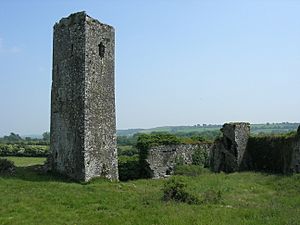Dominick Sarsfield, 1st Viscount Sarsfield facts for kids
Dominick Sarsfield, 1st Viscount Sarsfield of Kilmallock (around 1570–1636) was an important Irish judge and nobleman. He became the Chief Justice of the Irish Common Pleas, which is a very high legal position. However, he was later removed from his job because of accusations of corruption and died in disgrace.
Early Life and Career
Dominick Sarsfield was born in Cork, Ireland. He was the third son of Edmund Sarsfield, who was an alderman (a senior member of a city council) in Cork. Dominick married twice. His first wife was Joan Terry, and they had at least five children, including his eldest son, William.
In 1593, Dominick Sarsfield began studying law at Middle Temple in London. He returned to Ireland before 1600 to work as a lawyer. He quickly rose through the legal ranks. In 1600, he became the Attorney General for the province of Munster. By 1604, he was the Chief Justice of Munster.
His career continued to advance. In 1607, he became a judge in the Court of King's Bench in Ireland. Then, in 1612, he was appointed Chief Justice of the Irish Common Pleas, one of the most powerful legal jobs in Ireland.
In 1619, he was given the title of the first Irish baronet, which is a special honor. In 1625, he became a nobleman, a Viscount. He wanted to be called Viscount Kinsale, but another family already had a similar title. So, he agreed to be called Viscount Kilmallock instead.
Sarsfield's main home was Carrigleamleary Castle, near Mallow in County Cork. Today, only ruins of the castle remain.
The Bushen Case
A significant event in Dominick Sarsfield's career was the trial of Philip Bushen. Bushen was an elderly farmer from County Kildare, accused of causing his wife's death in 1620. Many people doubted his guilt, and two grand juries (groups of citizens who decide if there's enough evidence for a trial) refused to charge him.
Sarsfield was chosen to oversee this trial. He was the only senior judge who spoke fluent Irish, which was important because the case was heard in the Irish language.
However, Sarsfield's actions during the trial were later heavily criticized. It was said that he heard parts of the case in private and didn't let Bushen speak much in his own defense. He was also accused of pressuring the jury to find Bushen guilty. The most serious accusation was that Sarsfield had made a secret deal with the local sheriff to share Bushen's property if he was found guilty.
Downfall
Philip Bushen was found guilty and executed. At the time, there were some concerns about the trial because Sarsfield had a reputation for being unfair.
Years later, in 1633, the case became a major scandal. A special court called the Star Chamber investigated Sarsfield's conduct. The court found strong evidence that Sarsfield was guilty of corruption. The Lord Keeper, a very important legal official, stated that justice should be done openly, not in private. He also believed that Bushen might have been innocent.
On November 20, 1633, Sarsfield was found guilty of corruption again. He was removed from his position as Chief Justice, fined a large sum of money (£5000), and ordered to pay £2000 to Bushen's family. He was also sent to Fleet Prison. Dominick Sarsfield died in 1636, having lost his good name. He was buried in Cork.
Descendants
Dominick Sarsfield's eldest son, William, became the second Viscount Sarsfield after his father's death. However, William had to sell their family home, Carrigleamleary Castle, possibly because of his father's debts.
One of Dominick's daughters, Catherine, married Sir John Meade the elder. Another daughter, Jenet, married William Barrett, whose family owned Ballincollig Castle.

Assessment
Historians have different views on Dominick Sarsfield. Some agree that his actions in the Bushen case were wrong. However, they question if he was truly motivated by greed, suggesting he might have genuinely believed Bushen was guilty. Others believe that Sarsfield was indeed driven by greed and that his behavior was part of a bigger problem of corruption among judges in Ireland at that time.
 | James Van Der Zee |
 | Alma Thomas |
 | Ellis Wilson |
 | Margaret Taylor-Burroughs |

